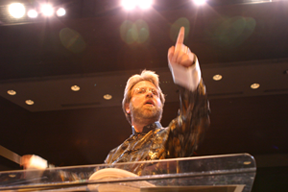
Attention neighbors of Redwood Symphony (Peninsula and beyond): no need to travel to Berlin or Vienna or San Francisco to hear one of the most magnificent and challenging of Mahler's symphonies, his farewell to life in a work of sheer beauty and catharsis.
Not only do Eric Kujawsky and his Redwood Symphony offer the Mahler Ninth on Nov. 22, in Redwood City's Cañada College, but in an unprecedented accomplishment for a regional, all-volunteer orchestra, they will perform the work for the third time over the span of three decades.
Even more impressive, this could be the beginning of the orchestra's third Mahler cycle — after one run of all ten, plus Das Lied von der Erde, and a second cycle of all but the Eighth ("which takes a huge effort to put together," says Kujawsky, as if the others, especially the Second weren't).
Asked about the occasion, Kujawsky said:
For the vast majority of musicians and conductors, an opportunity to perform Mahler's Ninth Symphony is a pipe dream, something that will never be — or at best, a once-in-a-lifetime experience.This will be my (and Redwood Symphony's) third time in 30 seasons performing this monumental work; we know how lucky we are to do such repertoire on an almost routine basis! Starting a third cycle of Mahler symphonies is certainly a pleasure.Because of Beethoven's example, Mahler had a superstitious fear of dying after writing a Ninth, so he didn't number his real Ninth, Das Lied von der Erde (The Song of the Earth). He died before completing his Tenth (really his Eleventh) Symphony, though, so the Ninth did turn out to be his last completed work.
The Ninth takes the listener on an epic, harrowing, even comical, but always uplifting journey through the stages of loss and grief that surround Death. No other instrumental work attempts this on such a scale.
It was hearing this work (and breaking down into tears) that finally convinced me that Mahler was among the greatest of all composers. His mastery of large-scale form is peerless and surprisingly economical, and nobody does counterpoint, motivic development or orchestration — oh, that orchestration! — better either.
But, finally, what makes Mahler popular is that he plumbs the depths of human emotion and comedy on the largest of canvases; every symphony is a universe — which is exactly what he aimed to do.
For the rest of the Redwood season, see the orchestra's website. Besides the Mahler, you will find both popular works and such unusual fare for a regional organization as music by Daughtery, McCracken, Bartok, and Berio.

